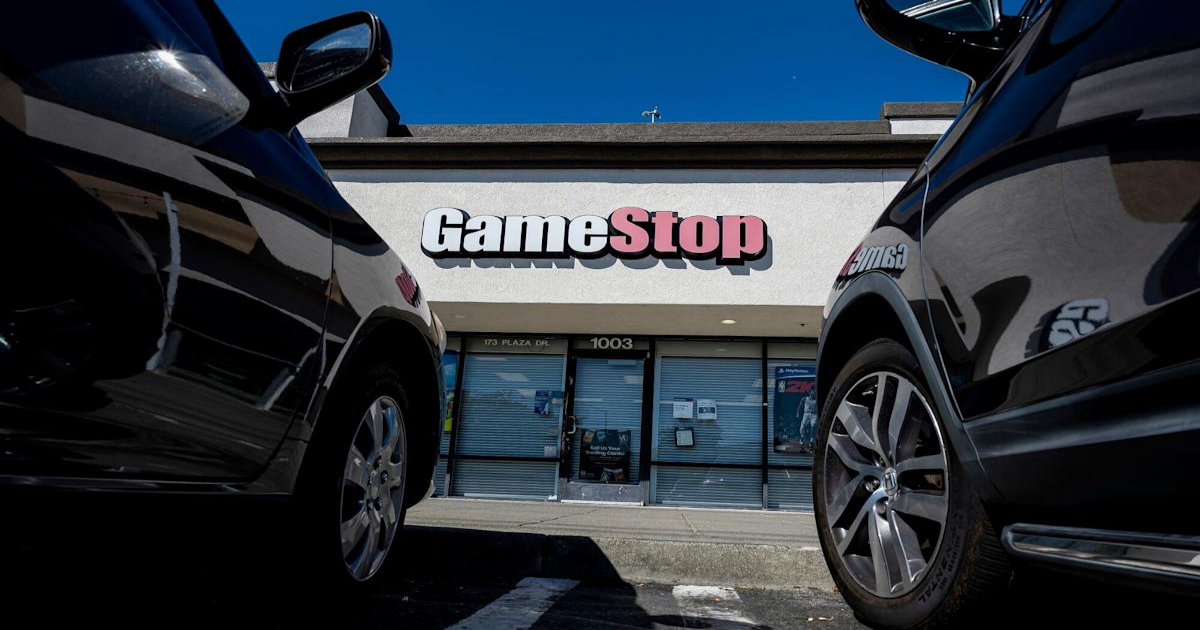(Bloomberg) — GameStop Corp. shares slumped as investors responded to the company’s plans to load up on debt in order to buy Bitcoin.
Most Read from Bloomberg
The video-game retailer erased a quarter of its value on Thursday, shedding $3 billion in market capitalization in its largest drop since last June. The rout came after the company, on Wednesday afternoon, announced plans to sell $1.3 billion in convertible bonds to fund Bitcoin purchases as it embraces a strategy that was developed by the cryptocurrency advocate Michael Saylor.
When the company made an initial announcement about its Bitcoin strategy on Tuesday afternoon, it sparked a rally in the shares, that brought the stock up by the time the markets closed on Wednesday. But the additional information about the bond sale soured the sentiment around the stock. The stock was down 25% on Thursday to $21.36 at 1:47 p.m. in New York.
Companies marketing large convertible debt sales tend to face short-term selling pressure. These bonds are popular with hedge funds that use them for a particular arbitrage strategy that capitalizes on the volatility of the underlying stock. In order to employ this strategy, the hedge funds have to short the shares of the company.
The Grapevine, Texas-based GameStop joins a growing list of public companies taking on convertible debt to buy Bitcoin in an attempt to capitalize on upswings in the cryptocurrency. The tactic was pioneered by Saylor’s Strategy, the enterprise software company formally known as MicroStrategy, which has acquired more than $40 billion in Bitcoin and seen its share price soar.
A convertible bond is a hybrid instrument that allows the holder to convert the bond into a predetermined number of shares if the stock rises above a certain level. GameStop is marketing its notes, which are due in 2030, with a 35% to 40% conversion premium, according to people familiar with the deal who asked not to be identified because the information is private. The premium determines the price at which the conversion happens.
GameStop’s entry into the market comes even as investors appear to be growing more skeptical of the strategy. The premium that GameStop is looking to offer on its bonds is less than the roughly 55% premium on a similar issue from Strategy in November. More recently, Strategy made a $2 billion sale in February that offered investors a more advantageous 35% premium. That along, with the terms on a growing slate of debt-like instruments offered by Strategy, suggest that investors are demanding more from the company.
A spokesperson for GameStop didn’t respond to requests for comment.
GameStop’s push to quickly ramp up its Bitcoin purchases comes against a starkly different backdrop than when Strategy and other copycats flooded the market at the end of 2024. The cryptocurrency is down roughly 18% from an all-time high in January and investors are bailing on a variety of risky assets amid tariff uncertainty and choppy economic data.
Still, the tactic is appealing for GameStop because it has been looking to diversify away from an underlying business that’s slowed as the video game business goes digital. The retailer reported late Tuesday that it would be closing more stores after fourth-quarter revenue declined 28% to $1.28 billion from the year-ago period. Sales of hardware, accessories and software declined in the quarter, though collectible sales rose.
Cohen became the chairman of GameStop in 2021 — and CEO in 2023 — after an activist battle that helped turn the company into a meme stock at the height of the pandemic. Since then he has tried various strategies to revive the faltering company. The company announced in 2023 that Cohen would be allowed to use the company’s cash to buy stock in other companies. Recently, there has been anticipation among investors that GameStop might follow in Strategy’s footsteps after Cohen posted a picture of himself and Saylor on social media in early February.
A variety of companies ranging from medical tech providers to hotel developers have been inspired by the rise of Strategy. Its stock has increased over 2,600% since co-founder Saylor began investing the company’s cash into Bitcoin as a hedge against inflation in 2020. The cryptocurrency is up close to 700% over the same period.
Many companies have used corporate cash to purchase digital tokens. But a growing number have also taken the riskier route of taking on debt to fund the strategy. Convertible bonds can be more attractive for companies than share sales because the bonds don’t immediately dilute stockholders. The instruments have been popular with hedge funds because of the convertible bond arbitrage strategy that capitalizes on the volatility of the underlying stock. GameStop could be particularly attractive to this crowd because of the volatility it has experienced since becoming a favorite of retail traders back in 2021.
–With assistance from Matt Turner.
(Updates with market movement throughout)
Most Read from Bloomberg Businessweek
©2025 Bloomberg L.P.
